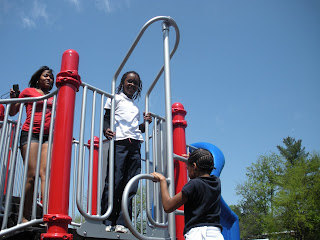The time I have spent over the last 10 weeks, both in the classroom and at AMIS, have been much more enriching than I ever thought they would be. I thought I was signing up for yet other class that would require lots of reading and out-of-the-box assignments that would ultimately leave me with little more than another grade at the end of the quarter. I couldn't have been more wrong.
Spending time with my mentee, Hawa, at AMIS was really enjoyable, and it never felt like a class assignment. I was learning from her and we were having fun together, whether that meant coloring, playing games on her Nintendo DS, or running around on the playground. I didn't dread that time that we spent at AMIS. Rather, I looked forward to it. In fact, I have found that, although I don't really miss the time spent driving back and forth, I do miss seeing the mentees.
I have learned a lot about immigration this quarter, both from the readings, the AMIS students, and the time spent in the classroom. One of the biggest things I have learned is that all immigrants are not the same. They all have different stories and have had different experiences. Trying to lump all immigrants into one neat group is like trying to say that all college students are the same; that they act the same, believe the same things, or have the same goals. It's simply not true. It's actually quite insulting to try and say that all immigrants are the same. If we, as a society, try to look at immigrants as individuals with different needs and different stories, we would all get along better and would be better able to relate to one another. We would realize that we actually may have a lot in common with many of the immigrants that we feel as though we are so different from. I realized this fact through my mentee, Hawa.
When we showed up at AMIS on that first day, I was sure that I was going to end up paired with some student that I may not be able to communicate with, and surely wouldn't have anything in common with. I was quite wrong. Hawa spoke exellent English, owned a Nintendo DS, and talked about the same things I would expect any other fourth grade girl to talk about. Over the weeks that we met, I realized that we had several things in common. We both had experienced moving to different schools, both had brothers that we fought with a lot, and both had family in far away places (although hers is quite a bit farther than mine). I came to like Hawa a lot, and hope to stay in contact with her in the future.
 |
| Hawa and I with her picture and certificate. |
 |
| Everyone in line for all the delicious food we brought! |
 |
| The students grabbing for candy after they broke the pinata! |




